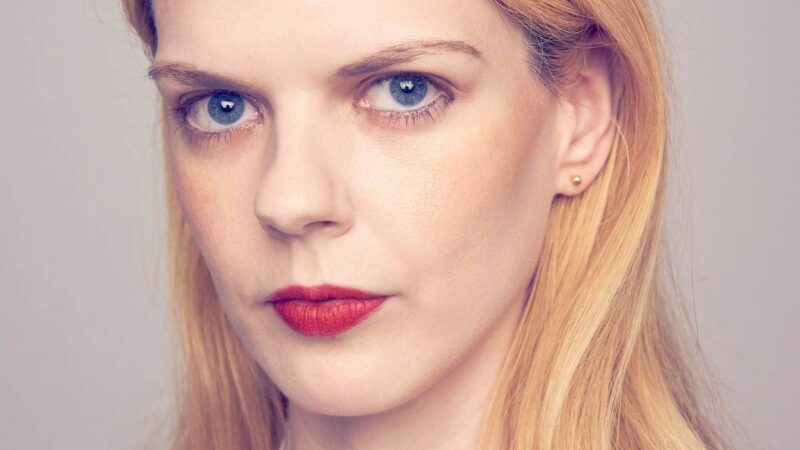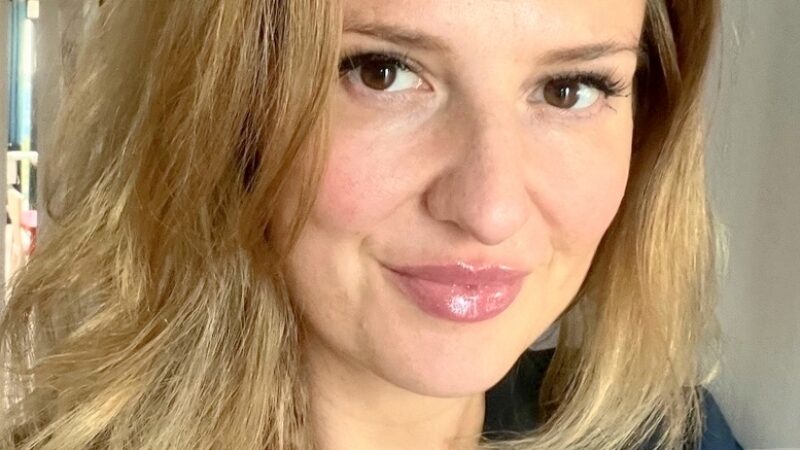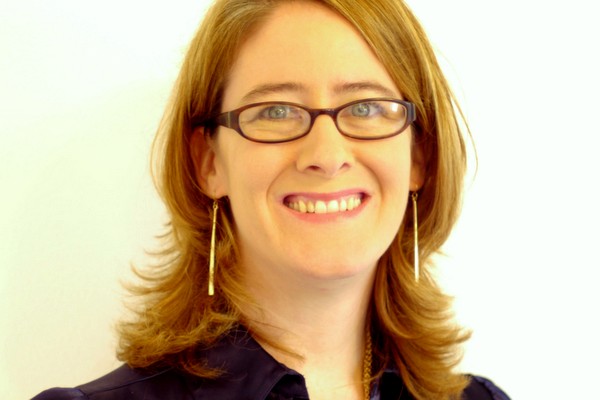
Erin Dooley was born and raised In the suburbs of Chicago. She went to Ohio for her college degree and earned a BS in Business. After college, Erin started writing Screenplays and after a few years, made a few shorts for film race events. She kept writing features and directed her first feature film in 2011, she followed it up with her second feature in 2014. Erin Dooley produced her first documentary film in 2015 and has released it in the fall of 2016. Erin Dooley moved to Los Angeles in 2015 where she freelances in writing and producing for film, short, web series and TV..
indieactivity: Why did you go into screenwriting & filmmaking
Erin: I was a pretty avid reader as a child and always thought I might like to be an author. Instead, I started writing a play after college. I quickly shifted to screenplays and have been writing ever since. I really like telling stories and learning about people. As a writer, I get to dive into all different types of situations in my scripts and create all types of characters. My main focus is on writing, but I have directed some of my projects so I could see them come to life.
An amazing night at the premiere of my film @Way2Forgiveness. pic.twitter.com/wuYP7ReEpX
— Erin R. Dooley (@erindooley34) November 7, 2016
indieactivity: How does an indie filmmaker distribute his/her film’?
Erin: That is a very good question! One I wish I had the perfect answer. I am self-distributing my documentary “A Way to Forgiveness” on Vimeo and on my website. I am a one-woman show until I can find someone to help with distribution. So, right now I am trying to get into every niche audience that I think would enjoy my film which means spending lots of time contacting people.
indieactivity: When does an indie filmmaker need to start planning for distribution?
Erin: I think you need to know your audience from the writing stage and pre-production. I don’t mean that you should chase an audience that went to see the latest hit. Rather, you should just be aware of the type of project you are writing. People stream far more than ever these days so not every film needs to be in a theater. I think it is helpful to know the end result so you will have a proper budget and use the right tools during production. Also, you can start building an audience early on with a ‘behind the scenes’ look during production and those people will be eager to see the finished product when you release.
indieactivity: . How do I get my film in theaters with such an indie budget?
Erin: Well, I go back to my earlier answer that not every film may need to be on a thousand screens in theaters. Of course, having a screening event is very satisfying after all the hard work and can drive VOD and DVD sales. With my documentary, I four-walled two theaters – one in Los Angeles and one in the Chicago area – and worked hard at getting those events to sell out. There are still some art house theaters or even playhouses with decent size screens that can be affordable for an indie filmmaker to rent. I encourage filmmakers to call around to get rates and build that into the budget from the beginning.
indieactivity: How can filmmakers finance their projects?
Erin: Of course, there is crowd-funding like IndieGoGo and Kickstarter but that takes a lot of effort and there are so many people doing that these days so it can be a full time job to do that right and reach your goal. Depending on your project, you may have a built-in base who may be willing to support a filmmaker financially with donations or pre-sales of a DVD or ticket to a premiere. For my documentary, I saved from each paycheck and sold some possessions to help the money.
I shot and edited the film myself, so I saved money there, of course. I’d say getting a handle on a realistic budget from the get-go is helpful. You may be able to get things for far cheaper than you think. Plus, this goes back to knowing your end result from the beginning – it all starts with the script. When I directed and produced my first film, I re-wrote a lot of it to save on location fees and other elements that I couldn’t afford. You need to write for the budget you have.
Actors read through my next script the other night. Now I’m making the changes based on their feedback. pic.twitter.com/l82vDMUh5L
— Erin R. Dooley (@erindooley34) August 2, 2014
indieactivity: What films have you written?
Erin: Gaff It Girl (Web Series) (2017 ), A Way to Forgiveness (Documentary) (2016), Baked Goodes (Web Series) (2 episodes – “Hellfire”, “Brimstoned” & “Surprise Visit”) 2016, Broken & Beautiful (2012), Shadows of Death (2014) (post-production), Joy Show (Short) (2016), Dooley’s Delight (Short) (2014), Forced (Short) (2014 ), The Created (Short) (2013), New Day (Short) (2012), Learning to Swim (Short) (2009).
indieactivity: What are the films that you have made?
Erin: In addition to the list above, I have helped produced a few other projects with other people. They can be found on my website.
indieactivity: Talk to us about your concept on collaboration?
Erin: Every person working on a film wants it to be the best it can be and uses his/her craft to heighten the project. I have gained a greater appreciation for this as I have worked on a number of teams in the past year and specifically talked with people in different departments. I have worked in a number of positions on film sets, so I can appreciate what that department does and have a better understanding on how to communicate with them.
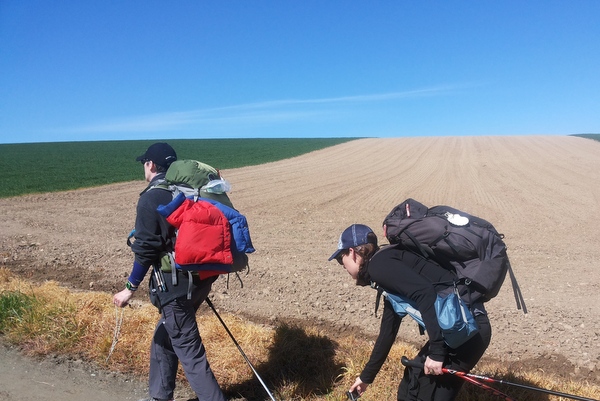
Erin Dooley walks the Camino as a fellow pilgrim films.
I think when you are putting together a team for a project you should know enough about each position to hire the best person you can afford for that role and then get out of their way so they can do their best work to make the film great! For me, it really hit home with the composer of my documentary. We met and talked about the spots in the film where we wanted music and talked about the emotion we wanted the audience to feel. The music he wrote evoked the exact emotion we wanted and really elevates the film.
indieactivity: How do you find the process of filmmaking as an indie filmmaker?
Erin: I am constantly learning from each project. Of course, a great struggle for most, if not all, indie filmmakers is the lack of funds. But even when I had little-to-no money, I still did the work from pre- to post-production the same as the times I have had money. They say you should dress for the job you want and I think you should do the job like the job you want. Don’t shirk on preparation, on respecting your cast and crew, and most importantly, on telling a great story just because you are lacking that pesky little thing called “money.” Make your project, get it out there for people to see, and then make another project.
indieactivity: Describe your recent work, or film?
Erin: My latest project was my documentary called “A Way to Forgiveness.” It tracks my journey walking 550 miles across Spain. I was already going to be walking this religious pilgrimage for personal reasons, and I figured I would be remiss as a filmmaker if I didn’t bring my camera to record my journey. I was backpacking across the country, so I only carried my GoPro, extra batteries, a bunch of SD cards, and a Zoom recorder. I didn’t have the full film mapped out. Not even close!
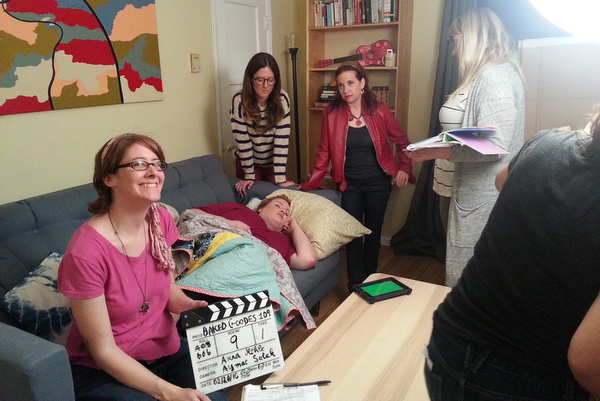
Erin Dooley on set with her co-producers, the women of Trashbones Productions.
All I knew was that I wanted to interview people on forgiveness, so I prepared a list of questions to ask people I met along the way. Filming as I walked was a little challenging since I had a selfie stick and a small tripod, and was doing it all myself. I did meet a camera operator along that way. One day she grabbed my camera and filmed me for a little as I walked. I joked with her that that footage would be the best shot of the entire film. Interviewing people I had just met was a little intimidating, but that got easier as we got to know each other over the course of the trip.
I edited the film myself. It started with a 2 hour rough cut, which I knew was far too long but I wanted some feedback since I was so close to the project. I showed it to a few people who I trusted and got some notes. I got it down to 1 hour and 20 minutes and then started talking to post sound people. Once I got those price quotes, I realized I couldn’t afford such a long film. I did a really difficult edit and got it down to 45 minutes. As difficult as that was, I was able to retain the heart of the story in this shorter edit.
I had produced two other features that have not yet gotten distribution, and I was tired of waiting on others to get this out in the world, so I decided to self-distribute. I held two premieres – one in LA and one in the Chicago area. I promoted them a lot on social media and via email. Then I started selling DVDs on my website and streaming on Vimeo. I am currently contacting churches and colleges to screen my film with a talk on forgiveness that I have developed.
indieactivity: What are your future goals?
Erin: My main goal is to continue writing feature screenplays and to sell them. My goal is to be a working writer.
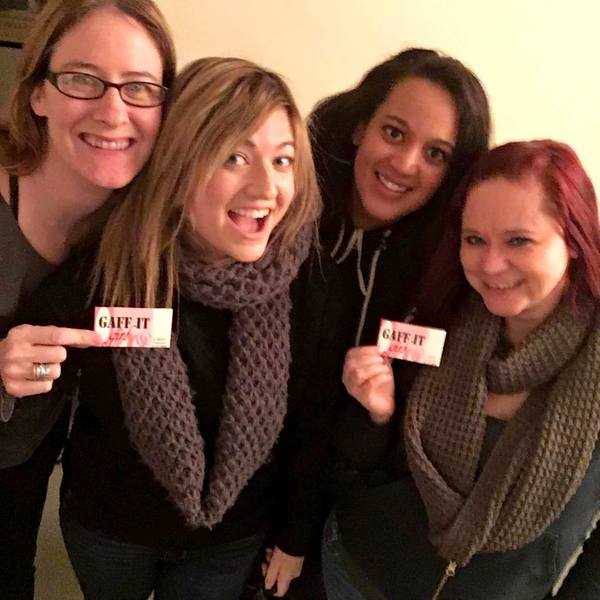
Erin Dooley with her co-producer and director JC Farris
indieactivity: Tell us about what you think indie filmmaker need in today’s world of filmmaking?
Erin: Story comes first. People can forgive a lower production value if it is an amazing story. Provided you have a great story, I think right now, it mostly comes down to marketing and finding your audience. The tools to make content is so accessible, so anyone can make their project. Of course that also leads to a glut of content which means audiences have so much to choose from. It is a matter of cutting through it all to let people know about your project.
indieactivity: Briefly talk about your career?
Erin: I have been writing since 2004. I directed my first feature film in 2011, a faith-based musical I wrote called “Broken & Beautiful.” In 2014, I directed my second feature, a supernatural thriller called “Shadows of Death.” That film is still in post-production, as it is effects heavy and I ran out of money in the budget. I produced my documentary “A Way to Forgiveness” and released it in the fall of 2016.
My projects can all be found on my website. I really enjoy working with actors – seeing them bring characters I write to life – but have realized that I would prefer to leave the directing to others who have more of a passion and skill for that craft. In the past year, I have done quite a bit of producing. I co-produced two web series in 2016. But I am returning to my first love – writing. For these web series, I wrote two episodes of “Baked Goodes” and all four episodes of “Gaff.
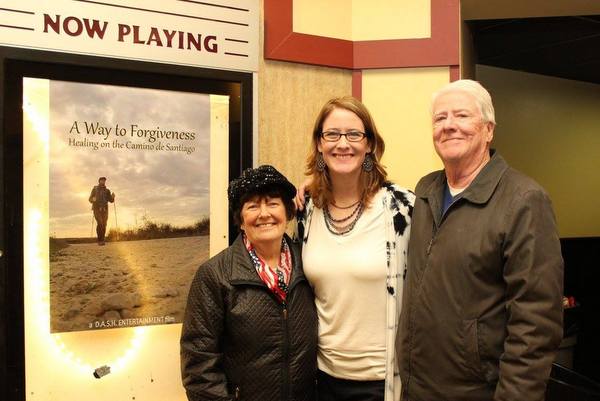
INTERVIEWS
In Camera by Naqqash Khlalid Launch on VOD April 29
Naqqash Khlalid’s Directs Nabhan Rizwan. In Camera stars an EE BAFTA Rising Star Award Nominee.
2025 Philip K. Dick Sci-Fi Film Festival Award Winners Announced
Vanessa Ly’s Memories of the Future Awarded Best PKD Feature
Dreaming of You by Jack McCafferty Debuts VOD & DVD for April Release
Freestyle Acquires “Dreaming of You” for April 15th Release
Hello Stranger by Paul Raschid set for London Games Festival & BIFFF
The film Is set for an April 10th Premiere at The Genesis Cinema in London (LGF) and BIFFF
Daydreamers Official Trailer by Timothy Linh Bui: Released by Dark Star Pictures
Daydreamers Vietnamese Vampire Thriller – May 2nd release
more interviews



